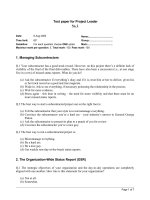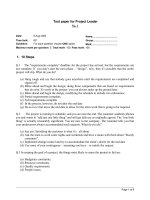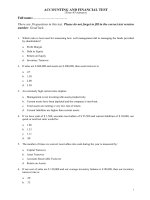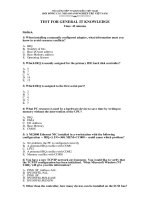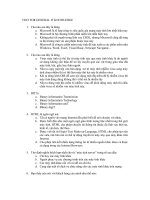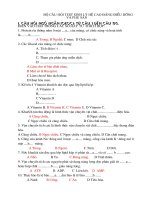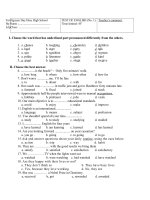- Trang chủ >>
- Đề thi >>
- Đề thi lớp 2
Entran test
Bạn đang xem bản rút gọn của tài liệu. Xem và tải ngay bản đầy đủ của tài liệu tại đây (141.32 KB, 13 trang )
<span class='text_page_counter'>(1)</span>Language Center Entrance Exam USE a BLUE or BLACK PEN!!! Examination rules: 1. Candidates are not allowed into examination room before the senior invigilator has given permission to enter. 2. Candidates MUST produce their ID cards before being admitted to the examination room. 3. All coats, bags, brief cases and other materials must be placed in the designated are, usually adjacent to the senior invigilator’s table. 4. All reference books, materials, papers, magazines and journals must be deposited at the senior invigilator’s table. Unless otherwise stared in the examination paper they must not be within the sight or reach of candidates. 5. All work must be carried out on the official question sheets. No other paper may be used. 6. Candidates may not borrow anything from other candidates . Contact an invigilator if in doubt. 7. You are NOT allowed to use a dictionary. 8. Candidates may not leave the room once the examination has started for any reason, inclusive of going to the toilet during the exam. Candidates leaving the examination room will not be allowed to come back into the examination room. You are advised to go to the toilet immediately before the examination. 9. Talking to anyone other that invigilator in the examination room is regarded as cheating. If you need assistance, please raise you hand to get the attention of an invigilator. DO NOT CALL OUT or MAKE ANY OTHER SOUND TO ATTRACT ATTENTION. 10. The examination will be conducted in strict silence. Mobile phones, pagers, and clock/watch alarms must be turned off. 11. Candidates are not allowed to leave the room after the invigilator announces a warning 15 minutes before the end of the exam. 12. Any candidate continuing to work after the invigilator announces that time is up or after the “pens down” announcement will be considered to have breached the rules and committed an act of cheating. 13. Examination results will be posted in the departments after the examination board’s deliberations. Candidates who have not paid tuition fees in full will not be informed of their results until they can produce a verifiable receipt from the accounting department to the Chairman of the department.. DO NOT FORGET TO TRANSFER YOUR ANSWERS TO THE ANSWER SHEET!.
<span class='text_page_counter'>(2)</span> Part One: Problematic Grammar Structures Read the incomplete sentences below. Choose the best answer (A, B, C, or D) for each gap. Write the correct letter in the answer sheet. 1. Tony _____ coffee. He wants tea. A. don’t want B. isn’t wanting. Questions 1 to 14. C. doesn’t want. 2. “What did you say?’ “ ___________.’ A. Nothing B. Nobody C. Anything. D. Not anything. 3. I ______ letter to my cousin now. A. write B. writes C. am writing. D. is writing. 4. “How often do you read a newspaper?” “ ___________ .” A. All day B. All days C. Every days D. Every day 5. “How _________ in this classroom?” A. are there many students B. many students there are C. many students are there D. many student is there 6. I like _______ those pictures. A. both B. both of C. either. D. either of. 7. Fatima and Dalia are sisters, but they don’t look ________ . A. same B. like C. alike 8. Jack was reading a book when the phone _______. A. ringing B. ringed C. rang D. was ringing 9.. Fumiko _____ to play the guitar very well. A. can to B. is able C. can. 10. I don’t like stories ____ have unhappy endings. A. that B. they C. which D. who 11.. Mr. Rice has been a doctor _________ . A. since 1980 B. since 20 years C. 20 years ago.. 12. What’s the name of the man _________ ? A. you borrowed his car B. which car you borrowed C. whose car you borrowed D. his car you borrowed 13. Each of the _______ own cage. A. birds has their B. bird has its C. birds have their D. birds has its 14. Before Anna came to Britain, she ______ understand much English. A. can B. can’t C. not D. couldn’t.
<span class='text_page_counter'>(3)</span> Part One: Problematic Grammar Structures Read the incomplete sentences below. Choose the best answer (A, B, C, or D) for each gap. Write the correct letter in the answer sheet.. Questions 15 to 27. 15. I didn’t realize I’d left my file at home until the meeting _______ . A. will start B. has started C. started D. start 16. The noise stopped as soon as the Head Teacher _____ into the room. A. walks B. walked C. was walking D. walking 17. Many crimes ______ by the law enforcement agencies. A. are preventing B. can prevent C. prevent 18.. “When _____?” “In 1928.” A. penicillin was discovered C. was penicillin discovered. D. can be prevented. B. did penicillin discovered D. did penicillin discover. 19. If I _______ you, I would get some rest before the game tomorrow. A. am B. could be C. were D. had been 20. We had better ___ an umbrella when we go out. It looks like it’s going to rain. A. taken B. to take C. take 21. The whole team must _____ together in order to win the game. A. worked B. to work C. work 22.. The university ______ by private funds as well as by tuition income and grants. A. is supported B. supports C. is supporting D. has supported. 23.. The customs officer opened the suitcase ________ if anything illegal was being brought into the country. A. seeing B. for seeing C. see D. to see. 24. The English ____ strong traditions. A. has many B. have much. C. have many. D. has much. 25. “ _____ letting me use your bicycle for a little while?” “Not at all.” A. Please to B. Would you mind C. Will you D. could you please 26. “Why don’t you stop work and concentrate on your golf?” “ I can’t afford ______ up work completely!” A. giving B. to give C. to have given D. having given 27.. “Why are you looking so pleased?” “Steve has ____ us out for a meal.” A. offered B. invited C. admitted. D. promised.
<span class='text_page_counter'>(4)</span> Part One: Problematic Grammar Structures Read the incomplete sentences below. Choose the best answer (A, B, C, or D) for each gap. Write the correct letter in the answer sheet.. Questions 28 to 40. 28. “Is that a history book you’ve got there?” “Yes, I’m very interested _____ Spanish History.” A. by B. at C. in D. for 29. “What was Thelma saying?” “She was asking me what time _____ work.” A. was I starting B. do I start C. I started. D. I have started. 30. “I can _______ remember having to use an old-fashioned typewriter.” A. yet B. already C. still D. ever 31. There are only two ____ for this job. A. customers B. candidates 32.. C. employees. D. employers. How much ______ money do you get per week? A. pocket B. pension C. pay D. perk. 33. Apparently, she _____ live in London about twenty years ago. A. use to B. was used to C. got used D. used to 34. “Where is she going for her holidays this year?” “She _____ about going abroad.” A. thinks B. will think C. has thought. D. is thinking. 35. “How’s your new job, Colin?” “ Not bad. I _____ used to it slowly but surely.” A am getting B. has get C. am going to get. D. have been. 36. “How do you feel now?’ “Oh, _____ better. Thank you.” A. very B .lot C. much. D. more. 37. The farmhouse is ______ in a very beautiful area. A. situated B. settled C. isolated D. found 38. The biggest advantage is that the shops are within easy ____ . A. touch B. contact C. access D. reach 39. “What do you think of the CD I gave you?” “It’s great! The _____ I listen to it, the more I like it.” A. much B. less C. more D. little 40. “How was the film on television last night?” “It was _____ good that I wish I had taped it.” A. such B. such a C. so D. as such.
<span class='text_page_counter'>(5)</span> Part One: Problematic Grammar Structures Read the incomplete sentences below. Choose the best answer (A, B, C, or D) for each gap. Write the correct letter in the answer sheet.. Questions 41 to 45. 41. I thought he was _____ when he suggested holiday in the Bahamas! A. playing B. amusing C. joking D. laughing 42. Classical music doesn’t seem to be very _____ with teenagers. A. popular B. famous C. favorite D. common 43. “Do I need a vaccination to go to Hawaii?” “I’m not sure. You ____ ask your doctor.” A. ought B. should C. will. D. need. 44. I was so late when I arrived at the airport that I ____ the plane almost immediately. A. entered B. reached C. boarded D. got 45. The situation was soon _____ the control of the police. A. behind B. beyond C. between. D. beneath.
<span class='text_page_counter'>(6)</span> Part Two: Grammar and Vocabulary in Context. Questions 46-60. Early European Dolls. Dolls have ..46.. as children’s playthings for thousands of years. However, they were ..47.. manufactured as toys in large numbers in Germany in the ..48.. century. The centers of the industry were factories at Nuremberg, Augsburg, and Sonneberg. The dolls were primitive and ..49.. of wood, clay, rags, and wax. They were dressed in clothes to ..50.. German women of the time. Soon factories in England, France, Holland, and Italy, as well as Germany, began .. 51.. dolls dressed in fashions ..52.. of their respective countries. Another ..53.. of doll, "lady" dolls, were extremely expensive and elegant, and were used as gifts ..54.. the aristocracy. These dolls, and the "fashion" dolls, which were later manufactured in Paris, have remained popular ..55.. since. Such dolls were often used to model the latest clothing trends and were sent from one country to another to show off the latest fashions. Today they are prized collector’s ..56.. By the 17th century, however, ..57.. dolls began to appear, made of cloth or leather, and these were very ..58.. as toys for both boys and girls. There were several improvements in manufacturing. Dolls’ heads became more realistic, and new materials were used. ..59.. in the 18th century manufacturers developed soft leather which ..60.. like human skin, and this was used in the more expensive dolls. Dolls began to look, feel, and move more like humans.. 46. A existed. B been. C used. D sported. 47. A initially. B factored. C first. D final. 48. A recent. B fifteenth. C fifteen. D fiveteen. 49. A fabricated. B construction. C fabric. D made. 50. A resemblance. B be as. C look like. D appear. 51. A production. B produce. C producing. D produced. 52. A clothes. B typical. C those. D famous. 53. A brand. B make. C breed. D type. 54. A among. B for. C to. D with. 55. A also. B for. C ever. D until. 56. A dolls. B things. C prizes. D items. 57. A latest. B cloth. C then. D simpler. 58. A adapted. B suitable. C useful. D utilized. 59. A Soon. B But. C Early. D When. 60. A resembled. B fits. C covering. D felt.
<span class='text_page_counter'>(7)</span> Part Two: Grammar and Vocabulary in Context. Questions 61-75. The Penny Black The Penny Black is the name of the world’s first postage stamp. It was introduced by the U.K. in 1840 and is perhaps the most ….61…. stamp ever issued. It has a … 62… of the young Queen Victoria and because of its color, and its ….63… of one penny, it is known as the ‘Penny Black’. …..64…. 1840, postage rates for delivery of letters in the U.K. depended on the …. 65…. the letter had to travel and the number of sheets of paper used. Furthermore, ….66… that time it was not possible to pay foe your letter before you sent it. The postage had to be paid by the receiver …. 67…. than sender of the letter. The Penny Black changed everything: at the rate of one penny, letters that did not ….68… more than half an ounce could be sent to any ….69… in the U.K. Nowadays, Penny Black stamps are not that rare although they are ….70… regarded by stamp collectors. About 68 million of these stamps were issued …71…. 1840 and 1841, and it is thought that about 1.5 million of these ….72…. today. The price of the stamp today varies according to whether it has been used or not and its condition. A fine used copy can be bought for around $77 or less, while unused examples are quite rare and sell for $2,000 or more. To ….73… the U.K. for having issued the world’s first postage stamp, the Universal Postal Union has made an exception regarding its ….74…. that the name of the country must ….75….. on a stamp to date has ever had the country name on it.. 61. A well-known. B popular. C fashionable. D famous. 62. A model. B picture. C statue. D painting. 63. A price. B amount. C sum. D worth. 64. A Earlier. B Former. C Before. D Previous. 65. A range. B length. C space. D distance. 66. A after. B by. C at. D in. 67. A other. B rather. C instead. D further. 68. A measure. B limit. C reach. D weigh. 69. A destination. B route. C station. D position. 70. A greatly. B highly. C warmly. D dearly. 71. A in. B about. C between. D among. 72. A survive. B live. C continue. D last. 73. A respect. B honour. C glory. D fame. 74. A law. B order. C command. D rule. 75. A show. B view. C appear. D display.
<span class='text_page_counter'>(8)</span> Reading Comprehension Text One: Questions 76- 80 You are going to read an article about an unusual journey. Choose from the list (A-F) the heading which best fits each paragraph. A B C. A Happy Home-Coming A Silly Thing to Do The Start of the Adventure. D E. An Eventful Journey A Friendly Race. Round Ireland with a Fridge 76 Ireland may be the one country in the world where the strangest behavior will be received with humour and hospitality. The Irish people are warm, generous and open to all kinds of illogical ideas. There may be no other country where it is possible to go hitch-hiking with a household appliance and experience not a dreadful ordeal but a wonderful journey on which firm new friendships are instantly made. 77 It had been years since Tony Hawks had seen a man standing in an Irish country lane, trying to hitch a ride with a fridge, but he couldn’t forget the sight, or the idea. One night, he made a bet with a friend, Kevin, that he could hitch-hike around Ireland with a fridge. It was a crazy idea and a foolish bet, but it led to an amazing and amusing adventure. 78 Tony and his fridge started their memorable journey in Dublin. They took a bus to a small town named Kells, where the people were as friendly else in Ireland, and from there the true journey began. Tony and his fridge hitched lifts from town to town, meeting interesting people and having strange, wonderful and downright silly adventures,. A popular radio show became interested in their journey and covered their progress on air, so that soon almost everyone in Ireland knew about ‘Fridge Man’ and wanted to help in any way they could, if only by thinking of a crazy activity for the fridge to take part in. 79 Their journey included a trip to Tory Island to meet the poorest king in the world and a bizarre surfing expedition. They entered (and won) a bachelor competition and provided the inspiration for what was possibly the world’s first ‘Fridge Party’. They slept in guest houses, hostels, and even a dog house. They traveled by car, lorry, boat, and even by horse-box. The fridge became a celebrity and was signed by students, landlords, tourists, reporters and nuns. Tony and his fridge attracted attention from newspapers and TV stations, as well as radio stations, because everyone wanted to know what had inspired him to make such an absurd journey. 80 Despite experiencing some difficulties and set-backs, Tony and his fridge managed to complete their journey and arrived in Dublin once again to find a warm welcome from those who had heard of his travels. He finally met the radio presenter who had been following and assisting his progress and he decided to write a book about his adventure. It had been an amazing experience which he would never forget and which would certainly entertain others. Tony felt happy as he traveled to Dublin airport by taxi. He was leaving Ireland, but he knew he would return one day, with or without his fridge!.
<span class='text_page_counter'>(9)</span> Part Three: Reading Comprehension Text Two Questions 81-87 Read an extract from an autobiography. For questions 81-87, choose the correct answer (A, B, C, or D) which you think fits best according to the text.. Don’t worry in silence! When we are young, sometimes the hardest thing about feelings is actually sharing them with others, though, I realize now, it is certainly worth making the effort to do so. Sharing with others helps us to share the load, as it were. It was not until much later, looking back over my childhood, that I realized that the first step in sharing was to identify what feelings I actually had! Making a list of them seemed to help. Was I happy or was I sad? Was it an emotion experienced only at that particular time or did I tend to feel like that all the time? My problem was that I had not realized that some fears are quite acceptable and even helpful at times, while others can actually get in the way of enjoying everyday things such as learning, playing with a friend or experiencing for the first time the change from Primary to Secondary level. This is when I really should have had a chat with my parents instead of holding it all inside, as they would have been able to lessen my anxiety about moving up. There were times when my anxiety would also be accompanied by a headache, a stomachache or dizziness. My grandmother used to tell me that there is a certain part of the brain that controls that fight or flight feeling. Not that I had any idea what she was talking about as I must have been only about knee-high at the time! I recall a small group of us feeling uncomfortable at the idea of meeting new teachers or moving up to the ‘big’ school. That kind of discomfort at such an age is natural when faced with something new. Better late than never, I realized that being shy is not such a bad thing. Nobody actually sets out to be like that, it just happens naturally. I understood quite quickly that the key to shyness is just to be yourself. No matter the age, it’s healthy to get things off your chest! In fact, I quickly found that some of my friends had the same things and became quite happy to share their secrets. Sometimes, just inviting a shy child to join in a game a couple of times helped them to get over their feelings of shyness. There were other times when I felt sad about leaving Primary school, but even then, it was one of the many normal emotions or moods we have all experienced during that period of change. Unhappiness was the emotion I felt when I had to say goodbye to certain dear friends. It made me feel like crying, though even crying made me feel better as tears slowly washed away the negative emotions. When the sadness started to disappear, it felt as if a heavy weight had been lifted from my shoulders. I now realize at the tender age of twenty-eight that, even though, there might sometimes seem to be no reason to look on the bright side of life, foe every bad there is a good. Also, having friends who think optimistically can help you get on your feet again and move forward onto a more positive path..
<span class='text_page_counter'>(10)</span> 81. What do youngsters find most difficult to do? A. make an effort C. accept help from others B. realize that life is hard D. tell others how they feel 82. What was the writer’s first move towards sharing her feelings? A. to look back over the years B. to finish writing her lists of feelings C. to decide which particular feelings she had D. to ask people questions about her feelings 83. What the writer finally realized about fears is that A they all get in the way. B they can happen every day. C it is better to hold them inside. D some are more helpful than others. 84. What does the writer mean by ‘knee-high’? A. too short B. too young C. too high. D. too tall. 85. According to the writer, what is the best way to handle shyness? A. to be your usual self B. to realize that age matters C. to understand that it is unhealthy D. to realize that it is uncomfortable 86. When the writer’s sadness began to disappear she felt A. she had lost weight C. more emotional about life B. she was heavier D. more positive about life 87. The writer realizes now for the first time that A. it’s difficult to tell good from bad. B. she had optimistic friends. C. you can get on your feet again yourself. D. there is always a reason to look on the bright side..
<span class='text_page_counter'>(11)</span> Part Three: Reading Comprehension Text Three Questions 88-100 Read the texts A, B, C, D. For questions 88-100 choose the correct answer. Some of the organizations may be chosen more than once, e.g. in questions 89, 90 and 94, 95. When more that one answer is required, these may be given in any order. There is an example at the beginning (0).. WE’RE YOUNGER THAN WE EVER WERE. Today’s mature adults are participating in all kinds of activities, both physical and intellectual. Old people have never been so young. A. A Helping Hand If you belong to the older generation, Singapore is a good place to live! On this island, the Ministry for Community Development and Sport is working hard to encourage sporting activities among all age groups, including the older citizens. The Ministry believes that physical activity helps people to keep a positive self-image and contributes to their sense of well-being: mental as well as physical. There are two main programmes which aim to promote and encourage different activities among the older generation. The first of these is a Mutual Help programme, where older people meet for various activities including sports. Here, the emphasis is on helping and thinking of other people. The second programme is a programme of activities organized by the Senior Citizens’ Clubs. Many of these clubs have keep-fit equipment, and a large number of social and cultural events take place there, as well as sporting activities. Both programmes aim to encourage older people to lead an active, healthy and meaningful life. B. Healthy Exercise In Ireland, there is a national programme for sport and physical activity for older people. It is called ”Go for Life”. The physical fitness professionals on this programme work exclusively with older people. We know that regular physical activity is good for our health. Research also proves that it can prevent many common illnesses, such as high blood pressure and asthma. Physical exercise will also help people who already have such illnesses. However, people often become less active as they get older. This is probably because they feel that they are “too old” to participate in sports. Nothing could be less true. Older people can take part in the programme on their own, with activities such as walking, gardening or swimming, or they can bring their friends to organized events in their own area, such as bowling, tennis or dancing. There is a free book called Opportunities in Retirement which suggests different kinds of activities and gives contact details of different organizations..
<span class='text_page_counter'>(12)</span> C. Lifelong Learning Elderhostel, founded in 1975, is the world’s largest educational and travel organization for older adults. Its aim is to excite people’s minds and enrich people’s lives. There are no examinations or marks. All that you need, in order to enroll on a programme, is an enquiring mind and an adventurous spirit. Also, of course, you need to believe that leaning and discovery continue all your life. There are expert instructors and cultural excursions. Elderhostel offers a large number of programmes in a huge variety of areas. First of all, there are traditional programmes. Here, people study ancient histories, literature and art, and can learn about different cultures, modern peoples and issues. Then there is a group of adventures programmes involving activities like hiking, kayaking, biking and studying whales. There are also programmes which give people the chance to help communities in different ways, such as protecting endangered species, tutoring school children and building affordable housing. Finally, there are programmes which take place aboard a boat, anywhere from the Antarctic waters to the Mississippi River. D. The Spice of Life Port Lincoln, a city in Australia, is a place which is particularly geared to older people. This is because of an organization called OPINACT’s motto is: “ Promoting the lifestyle of the over 50’s in Port Lincoln”. Amongst other things, it provides simple, on-line information on activities and services. For example, under the heading “Lifestyle”, it lists 28 different options, ranging from “Boating & Fishing” to “Yoga”, from “Family History” to “Tai-Chi”. There is no shortage of activities, here! In the “Sport” section, there are 33 different possibilities. Alongside the usual sports like swimming, hockey and cricket, you will find “Dog Clubs”, “Flying Dogs” and “Aussie Sports”. The “seniors” page shows fascinating headings, such as “Age of Reason”, “Year of Older Persons” and “Seniors in Cyberspace”. Clearly, they believe in the connection between physical health and mental health. The word “old” has a very different and very positive meaning in Port Lincoln! Which organization(s): * has professionals to help older people with sporting activities? * has a programme which enables you to find out about your ancestors? * have programmes involving animals? * gives students the chance to construct low-price accommodation? * is organized by a government department? * is appropriate for people who like excitement? * believe in exercising the mind as well as the body? * encourages activities for one person and for groups? * enables students to help animals that are in danger of becoming extinct? * has a big website? * organizes sporting activities, and nothing else, for older adults? * has two programmes of activities?. 0 C example 88……. 89…….90….. 91…….. 92…….. 93…….. 94… 95…. 96…….. 97……. 98…….. 99……. 100…..
<span class='text_page_counter'>(13)</span> Key # A 05 1 2 3 4 5 6 7 8 9 10 11 12 13 14 15 16 17 18 19 20 21 22 23 24 25. C A C D C B C C B A A C D D C B D C C C C A D C B. 26 27 28 29 30 31 32 33 34 35 36 37 38 39 40 41 42 43 44 45 46 47 48 49 50. B B C C C B A D A C A D C C C A B C B A A B D C. 51 52 53 54 55 56 57 58 59 60 61 62 63 64 65 66 67 68 69 70 71 72 73 74 75. C B D B C D D B C D D B A C D C B D A B C A B D C. 76 77 78 79 80 81 82 83 84 85 86 87 88 89 90 91 92 93 94 95 96 97 98 99 100. E B C D A D C D B A D D D C D C A C A D B C D B A.
<span class='text_page_counter'>(14)</span>

